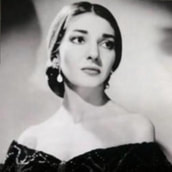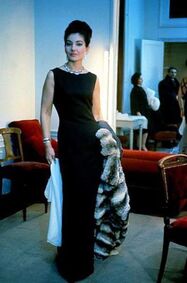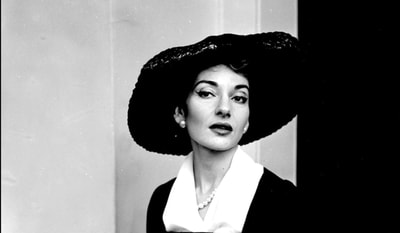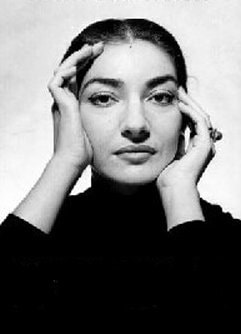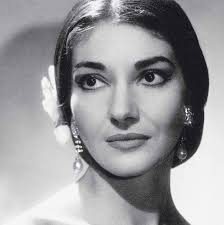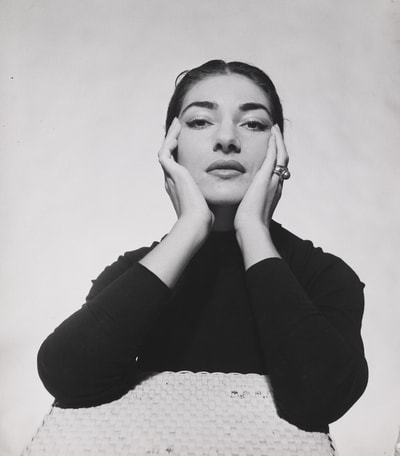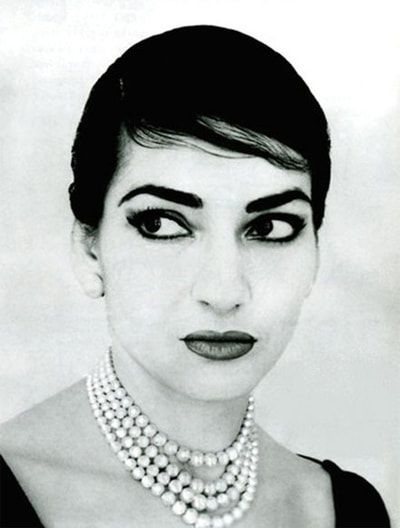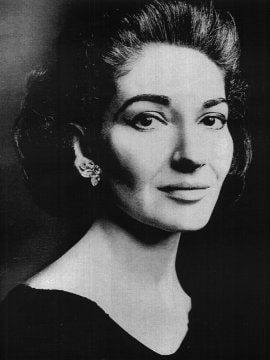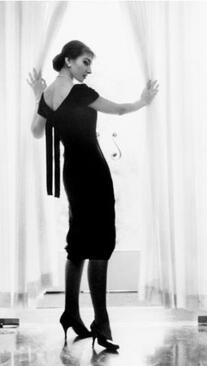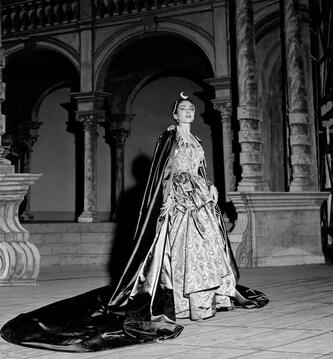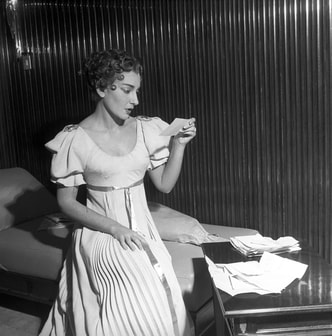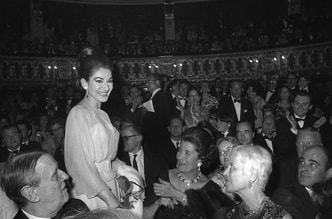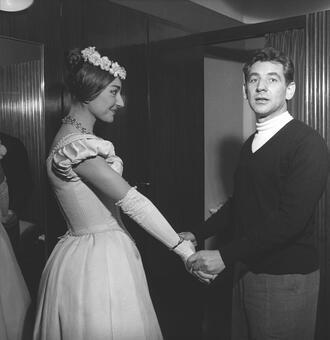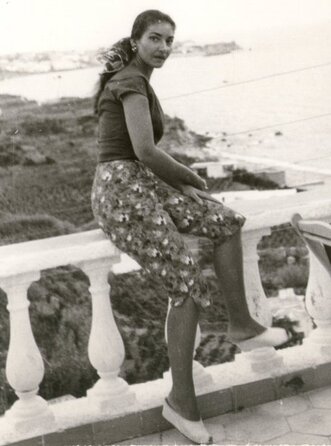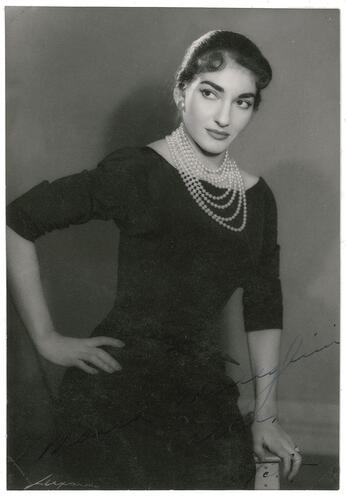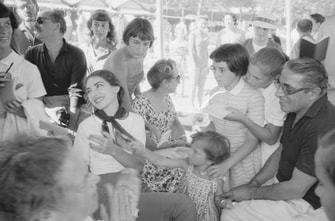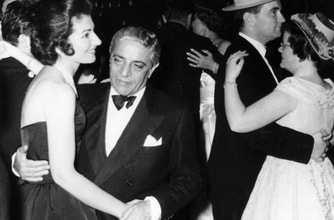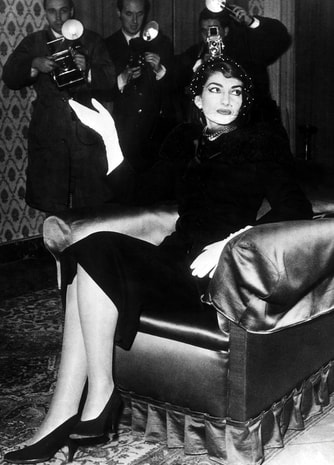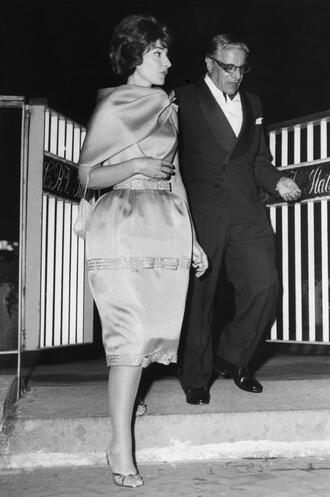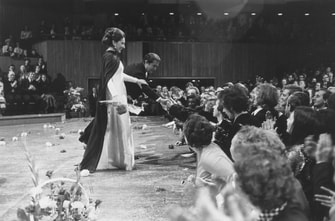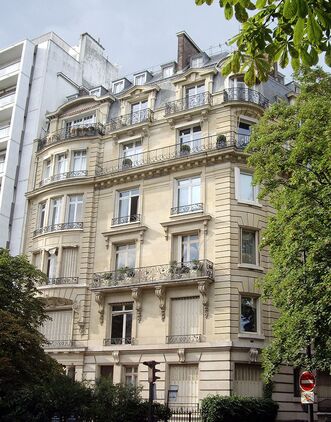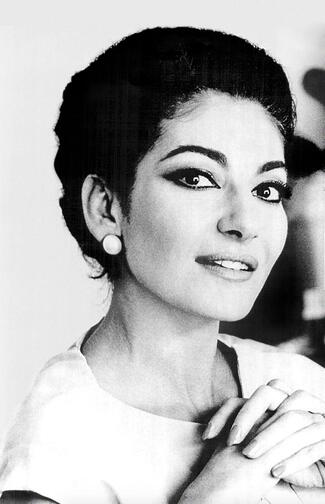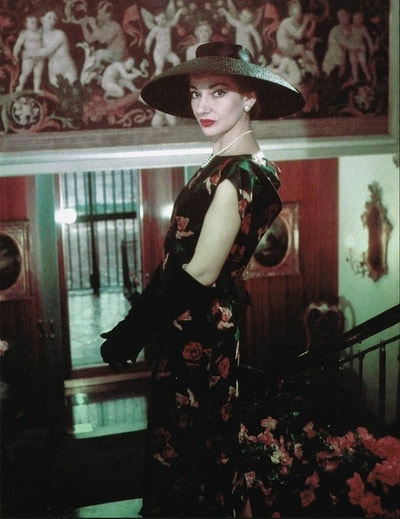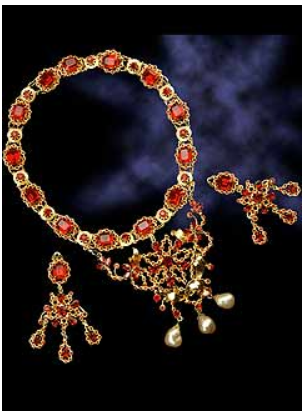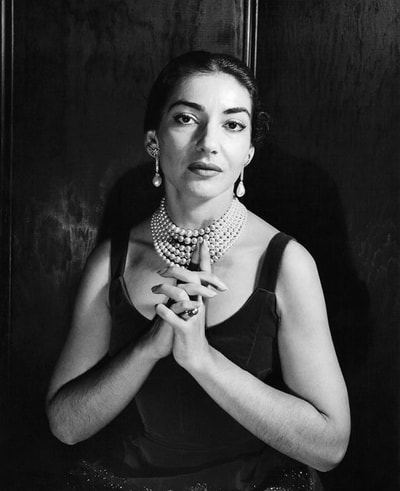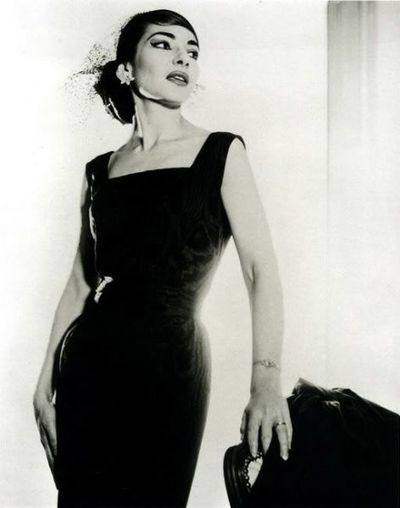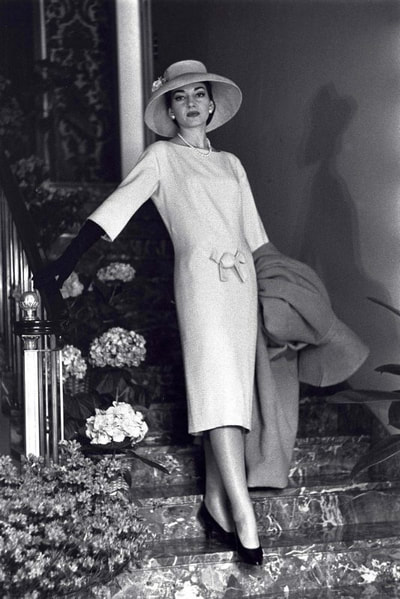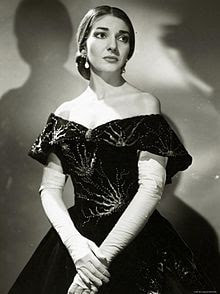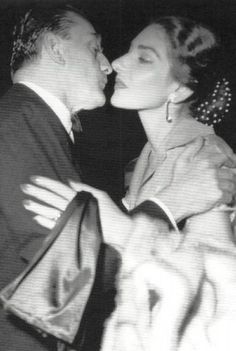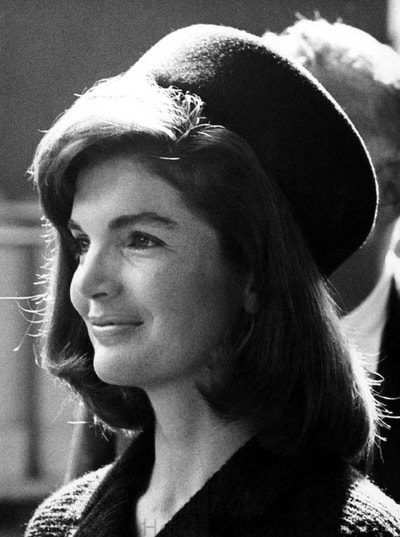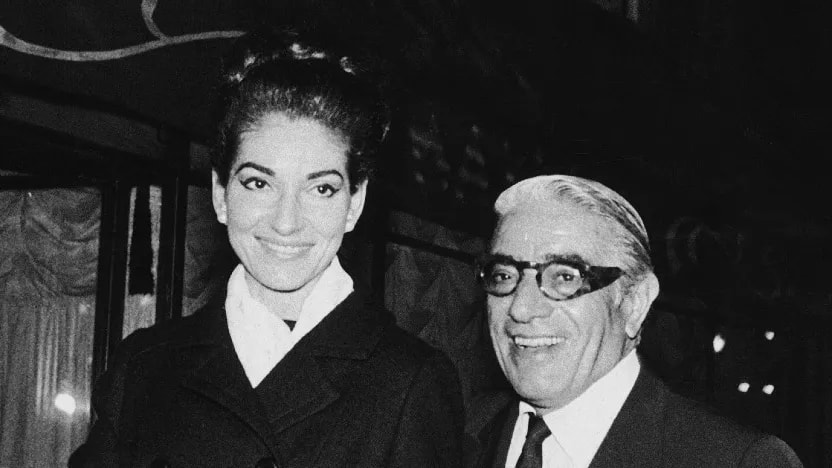Maria Callas, was a Greek-American soprano, and one of the most renowned and influential opera singers of the 20th century. Many critics praised her bel canto technique, wide-ranging voice and dramatic interpretations. Her artistic achievements were such that Leonard Bernstein called her "the Bible of opera" and her influence so enduring that, in 2006, Opera News wrote of her: "Nearly thirty years after her death, she's still the definition of the diva as artist—and still one of classical music's best-selling vocalists.
Maria Callas´s repertoire ranged from classical opera seria to the bel canto operas of Donizetti, Bellini and Rossini and further, to the works of Verdi and Puccini; and, in her early career, to the music dramas of Wagner. Her musical and dramatic talents led to her being hailed as La Divina.
Maria Callas´s repertoire ranged from classical opera seria to the bel canto operas of Donizetti, Bellini and Rossini and further, to the works of Verdi and Puccini; and, in her early career, to the music dramas of Wagner. Her musical and dramatic talents led to her being hailed as La Divina.
I am a creature of destiny. Destiny chose me, wanted me this way. I am outside myself and watch my life from the outside.” |
|
1954: year of transformation.
Maria Callas lost 30 kilos, the duckling was transformed into a white swan
1957: love of her life: Aristotle Onassis
In 1957, while still married to husband Giovanni Battista Meneghini, Maria Callas was introduced to Greek shipping magnate Aristotle Onassis at a party given in her honor by Elsa Maxwell after a performance in Donizetti's Anna Bolena. The affair that followed received much publicity in the popular press, and in November 1959, Callas left her husband.
The very public affair lasted over a decade until Aristotle Onassis left her for Jacquelin Kennedy and later married her, but he later resumed to meet her again in Paris when his marriage with Jacqueline Kennedy was in trouble.
The very public affair lasted over a decade until Aristotle Onassis left her for Jacquelin Kennedy and later married her, but he later resumed to meet her again in Paris when his marriage with Jacqueline Kennedy was in trouble.
1977: Death
Maria Callas spent her last years living largely in isolation in Paris and died of a heart attach on 16 September 1977.
Articles
Books:
|
|
|
|
|
Videos:
Performances
|
|
Maria Callas First Recital Norma 1949
Vincenzo Bellini 1801-1835 Norma (Romani) Arias: Casta Diva (Act I) Ah! Bello a me ritorna (Act I) Maria Callas-Soprano Recorded 8-10.XI.1949, Turin Italy Orchestra Sinfonica di Torino della RAI Arturo Basile-Conductor Enregistré: §1949* Private Recording* |
|
|
Maria Callas sings "Casta Diva" (Bellini: Norma, Act 1)
The great Maria Callas performs an aria from her signature role, Bellini's druid priestess Norma, with the Orchestre de l'Opera National de Paris and Georges Sebastian. Recorded live at the Palais Garnier on the 19th of December 1958, this concert marked the soprano's debut at the Paris Opera, a major social event for Parisians and for which Callas donned her most elegant couture and a million dollars' worth of jewelry. |
|
|
Maria Callas - 50 Most Beautiful Opera Arias
1 - 00:00 - Norma, Act I, Scene 4: "Casta diva... Fine al rito" (Norma, Coro) 2 - 10:50 - Carmen, Act I, Scene 5: "L'amour est un oiseau rebelle" (Carmen) 3 - 14:50 - La traviata, Act I, Scene 2: "Libiam ne' lieti calici" (Alfredo, Violetta, Coro) 4 - 18:02 - La Wally, Act I: "Ebben? Ne andrò lontana" (Wally) 5 - 22:51 - Gianni Schicchi, Act I: "O mio babbino caro" (Lauretta) 6 - 25:23 - Madama Butterfly, Act II: "Un bel dì, vedremo" (Madama Butterfly) 7 - 30:04 - Andrea Chénier, Act III: "La mamma morta" (Maddalena) 8 - 34:54 - La forza del destino, Act IV: "Pace, pace, mio Dio" (Leonora) 9 - 41:17 - Orfeo ed Euridice, Act III, Scene 1: "J'ai perdu mon Eurydice" (Orfeo) 10 - 45:37 - Alceste, Act I, Scene 5: "Divinités du Styx" (Alceste) 11 - 49:57 - Medea, Act I: "Taci, Giason" (Medea, Giasone) 12 - 52:24 - La vestale, Act II: "O nume tutelar" (Julia) 13 - 54:53 - The Barber of Seville, Act I, Scene 5: "Una voce poco fa" (Rosina) 14 - 01:01:12 - Anna Bolena, Act II, Scene 13: "Coppia iniqua" 15 - 01:04:14 - Lucia di Lammermoor, Act III, Scene 4: "Oh, giusto cielo!... Il dolce suono" (Coro, Lucia) 16 - 01:07:42 - Il pirata, Act II, Scene 12: "Qual suono ferale echeggia" & "Oh, sole! Ti vela di tenebre oscure" 17 - 01:11:57 - La sonnambula, Act I: "Care compagne" (Amina, Choeur) 18 - 01:14:08 - I puritani, Act II: "O rendetemi la speme... Qui la voce" (Elvira, Giorgio, Riccardo) 19 - 01:26:59 - Adriana Lecouvreur, Act I, Scene 2: "Ecco: respiro appena" (Adriana) 20 - 01:30:42 - Adriana Lecouvreur, Act IV, Scene 5: "Poveri fiori" (Adriana) 21 - 01:33:53 - Nabucco, Act II, Scene 1: "Ben io t'invenni - Anch'io dischiuso un giorno" (Abigaille) 22 - 01:43:01 - Ernani, Act I, Scene 3: "Surta è la notte" & Cavatina. "Ernani! Ernani, involami" (Elvira) 23 - 01:49:17 - Macbeth, Act II, Scene 1: "La luce langue" (Lady Macbeth) 24 - 01:53:25 - Rigoletto, Act I: "Gualtier Maldé" (Gilda) 25 - 02:00:53 - La traviata, Act I, Scene 5: "Ah, fors'è lui" (Violetta) 26 - 02:03:54 - La traviata, Act I, Scene 5: "Sempre libera degg'io" (Violetta, Alfredo) 27 - 02:07:50 - I vespri siciliani, Act V, Scene 2: "Mercé, dilette amiche" (Elena) 28 - 02:11:48 - Un ballo in maschera, Act II: "Ecco l'orrido campo" (Amelia) 29 - 02:18:32 - La forza del destino, Act II, Scene 10: "La Vergine degli angeli" (Coro, Leonora) 30 - 02:22:07 - Don Carlo, Act IV, Scene 2: "Tu che le vanità" (Elisabeth) 31 - 02:32:48 - Aida, Act I: "Ritorna vincitor" (Aida) 32 - 02:40:05 - Le pardon de Ploërmel, Act II, Scene 3: "Ombra leggera" (Dinorah) 33 - 02:45:44 - Mignon, Act II: "Ah, pour ce soir... Je suis Titania la blonde" (Philine) 34 - 02:50:51 - Hamlet, Act IV: "Et maintenant écoutez ma chanson" (Ophélie) 35 - 02:55:14 - Roméo et Juliette, Act I: "Ah! Je veux vivre dans ce rêve" (Juliette) 36 - 02:58:49 - Mefistofele, Act III: "L'altra notte in fondo al mare" (Margherita) 37 - 03:06:12 - Carmen, Act I, Scene 10: "Près des remparts de Séville" (Carmen) 38 - 03:08:12 - La Gioconda, Act I, Scene 3: "Madre adorata" (La Gioconda, Barnaba, La Cieca) 39 - 03:12:03 - Samson et Dalila, Op. 47, Act I, Scene 6: "Printemps qui commence" (Dalila) 40 - 03:17:15 - Lakmé, Act II: "Dov'è l'indiana bruna?" (Lakmé) 41 - 03:25:17 - Le Cid, Act III: "De cet affreux combat... Pleurez mes yeux" (Chimène) 42 - 03:31:20 - Pagliacci, Act I, Scene 2: "Qual fiamma avea nel guardo!" - "Stridono lassù" (Nedda) 43 - 03:35:59 - Louise, Act III, Scene 1: "Depuis le jour" (Louise) 44 - 03:40:42 - Manon Lescaut, Act IV: "Sola, perduta, abbandonata" (Manon) 45 - 03:46:32 - La bohème, Act I: "Sì. Mi chiamano Mimì" & "Ehi! Rodolfo!" (Mimi, Rodolfo, Schaunard, Colline, Marcello) 46 - 03:52:08 - La bohème, Act III: "Donde lieta uscì" (Mimì) 47 - 03:55:25 - Tosca, Act II, Scene 5: "Vissi d'arte, vissi d'amore" (Tosca) 48 - 03:58:40 - Madama Butterfly, Act I: "Vogliatemi bene" (Madama Butterfly, Pinkerton) 49 - 04:05:56 - Suor Angelica, Act I: "Senza mamma" (Suor Angelica) 50 - 04:11:28 - Turandot, Act I: "Signore, ascolta!" (Liù) |
|
|
Maria Callas - 90 Opera Arias
Georges Bizet (1838-1875) / Carmen 1. / L’amour est un oiseau rebelle / Habanera, Act l (00:00) 2.Près des remparts de Seville / Séguedille, Act l (04:17) Tenor : Nicolai Gedda 3.Les tringles des sistres tintaient / Chanson bohème, Act Il (08:47) Mezzo Soprano : Jane Berbié, Soprano : Nadine Sauterau Chœurs René Duclos / Chorus Master : Jean Laforge Orchestre du Théâtre National de l'Opéra de Paris / Georges Prêtre, 1964 Léo Delibes (1836-1891) / Lakmé 4.Dov'è l'indiana bruna ? / Lakmé, Act Il (13:04) Orchestra del Teatro alla Scala di Milano / Tullio Serafin, 1955 Giacomo Puccini (1858-1924) / Gianni Schicchi 5.O mio babbino caro (21:03) Philharmonia Orchestra / Tullio Serafin, 1954 Giacomo Puccini (1858-1924) / Tosca 6.Mario! Mario! Mario!, Act I (23:34) 7.Vissi d'arte, Act II (35:44) 8.Senti, l'ora vicina, Act Ill (39:00) Tenor : Giuseppe di Stefano Orchestra del Teatro alla Scala di Milano / Victor de Sabata, 1953 Vincenzo Bellini (1801-1835) / Norma 9.Casta Diva, Act l 10.Mira, o Norma, Act Il (44:22) Mezzo-Soprano : Ebe Stignani (51:40) Coro e Orchestra del Teatro alla Scala di Milano / Antonino Votto, 1954 Giacomo Puccini (1858-1924) / La Bohème 11.O soave fanciulla, Act I (58:52) Tenor : Giuseppe di Stefano Orchestra del Teatro alla Scala di Milano / Antonino Votto, 1956 12.Sì. Mi chiamano Mimì, Act I (1:02:56) 13.Donde pieta uscì, Act III (1:07:43) Giacomo Puccini (1858-1924) / Suor Angelica 14.Senza mamma, O bimbo (1:10:58) Philharmonia Orchestra / Tullio Serafin, 1954 Vincenzo Bellini (1801-1835) / La sonnambula 15.Care compagne.. (1:16:26) 16.Come per me sereno..Sempre, o felice Amina.. (1:18:36) 17.Sovra il sen la man mi posa, Act l (1:21:37) Coro e Orchestra del Teatro alla Scala di Milano / Antonino Votto, 1957 Gioachino Rossini (1792-1868) / Il barbiere di Siviglia 18.Una voce poco fa, Act l (1:24:13) Giacomo Meyerbeer (1791-1864) / Dinorah 19.Ombra leggera, Act Il (1:30:59) Giuseppe Verdi (1813-1901) / l vespri siciliani 20.Mercé, dilette amiche, Act V (1:36:35) Francesco Cilea (1866-1950) / Adriana Lecouvreur 21.Ecco: Respiro appena. lo son l'umile ancella, Act l (1:40:32) 22.Poveri fiori, Act IV (1:44:13) Philharmonia Orchestra / Tullio Serafin, 1954 Christoph Willibald Gluck (1714-1787) / Orphée et Eurydice 23.J’ai perdu mon Eurydice, Act IV (1:47:20) Camille Saint-Saëns (1835-1921) / Samson et Dalila 24.Printemps qui commence, Act l (1:51:40) 25.Samson, recherchant ma présence..Amour! Viens aider ma faiblesse! Act Il (1:56:49) 26.Mon coeur s'ouvre ta voix, Act Il (2:00:55) Charles Gounod (1818-1893) / Roméo et Juliette 27.Ah! Je veux vivre dans ce rêve, Act l (2:06:07) Ambroise Thomas (1811-1896) / Mignon 28.Ah, pour ce soir.. Je suis Titania - Polonaise, Act Il (2:09:42) Jules Massenet (1842-1912) / Le Cid 29.De cet affreux combat.. Pleurez, mes yeux! Act III (2:14:46) Gustave Charpentier (1860-1956) / Louise 30.Depuis le jour où je me suis donnée, Act III (2:20:47) Jules Massenet (1842-1912) / Manon 31.Je ne suis que faiblesse.. Adieu, notre petite table, Act Il (2:25:28) Jules Massenet (1842-1912) / Werther 32.Werther! Qui m'aurait dit.. Des cris joyeux - Letter Scene, Act III (2:28:43) Charles Gounod (1818-1893) / Faust 33.Je voudrais bien savoir.. ll était un Roi de Thulé.. Ô Dieu! que de bijoux.. Ah! je ris, Act III (2:35:42) Christoph Willibald Gluck (1714-1787) / Alceste 34.Divinités du Styx, Act l (2:47:08) Orchestre de la Société des Concerts du Conservatoire / Georges Prêtre, 1963 Gaetano Donizetti (1797-1848) / Anna Bolena 35.Piangete voi ? (2:51:26) 36.Al dolce guidami castel natio.. (2:56:17) 37.Qual mesto suon ? (3:00:38) 38.Coppia iniquia, l'estrema vendetta, Act Il (3:08:12) Contralto : Monica Sinclair contralto Tenors : John Lanigan, Duncan Robertson / Bass : Joseph Rouleau Philharmonia Orchestra & Chorus / Nicola Rescigno, 1958 Giacomo Puccini (1858-1924) / Manon Lescaut 39.In quelle trine morbide, Act II (3:11:11) 40.Sola, perduta, abbandonata, Act IV (3:13:57) Giacomo Puccini (1858-1924) / Madama Butterfly 41.Vogliatemi bene, Act l (3:19:47) Tenor : Nicolai Gedda Orchestra del Teatro alla Scala di Milano / Herbert von Karajan, 1955 42.Un bel dì vedremo, Act Il (3:27:03) 43.Con onor muore, Act Il (3:31:32) Giacomo Puccini (1858-1924) / Turandot 44.Signore, ascolta, Act l (3:35:10) 45.ln questa reggia Act Il (3:37:34) 46.Tu, che di gel sei cinta, Act III (3:43:54) Philharmonia Orchestra / Tullio Serafin, 1954 Umberto Giordano (1867-1948) / Andrea Chénier 47.La mamma morta, Act III (3:46:47) Alfredo Catalani (1854-1918) / La Wally 48.Ebben? Ne andrò lontana, Act l (3:51:23) Arrigo Boito (1842-1918) / Mefistofele 49.L’altra notte in fondo al mare, Act III (3:56:09) Luigi Cherubini (1760-1842) / Medea 50.Dei tuoi figli la madre, Act l (4:03:30) Gaspare Spontini (1774-1851) / La vestale 51.Tu che invoco con orrore, Act Il (4:08:13) 52.O Nume, tutelar, Act Il (4:18:58) 53.Caro ogetto, Act III (4:21:24) Orchestra del Teatro alla Scala di Milano / Tullio Serafin, 1955 Giuseppe Verdi (1813-1901) / Rigoletto 54.Gualtier Maldè.. Caro nome, Act l (4:25:05) Tenor : Renato Ercolani / Baritone : William Dickie / Bass : Carlo Forti Coro e Orchestra del Teatro alla Scala di Milano / Tullio Serafin, 1955 Giuseppe Verdi (1813-1901) / Il Trovatore 55.Che più t'arresti?.. (4:32:33) 56.Tacea la notte placida, Act l (4:34:49) 57.Quanto narrasti di turbamento.. (4:38:23) 58.Di tale amor, Act l (4:39:13) 59.Siam giunti; ecco la torre.. (4:40:49) 60.D’amor sull'ali rosee, Act IV (4:43:55) 61.Miserere...Quel suon, quelle preci, Act IV (4:47:56) 62.Di te, di te scordami! Tu vedrai che amore in terra, Act IV (4:52:50) Mezzo Soprano : Luisa Villa Tenors : Giuseppe di Stefano, Renato Ercolani Coro e Orchestra del Teatro alla Scala di Milano / Herbert von Karajan, 1956 Giuseppe Verdi (1813-1901) / Un ballo in maschera 63.Ecco l'orrido campo.. Ma dall'arido stelo divulsa, Act Il (4:55:23) Orchestra del Teatro alla Scala di Milano / Antonino Votto, 1956 Giuseppe Verdi (1813-1901) / La forza del destino 64.Sono giunta!.. Madre, pietosa vergine, Act Il (5:04:29) 65.La Vergine degli Angeli, Act Il (5:11:21) 66.Pace, pace, mio Dio! Act IV (5:14:56) Baritone : Renato Capecchi / Bass : Nicola Rossi-Lemeni Coro e Orchestra del Teatro alla Scala di Milano / Tullio Serafin, 1954 Giuseppe Verdi (1813-1901) / Aida 67.Qui Radamès verrà!.. (5:21:19) 68.O patria mia, Act III (5:22:59) 69.O terra, addio, Act IV (5:28:24) Tenor : Richard Tucker / Mezzo-Soprano : Fedora Barbieri Coro e Orchestra del Teatro alla Scala di Milano / Tullio Serafin, 1955 Giuseppe Verdi (1813-1901) / Macbeth 70.Nel della vittoria.. Ambizoso spirto.. Vieni! t'affretta, Act l (5:33:17) 71.La luce langue, Act Il (5:41:00) 72.Una macchia qui tuttora, Act IV (5:45:07) Giuseppe Verdi (1813-1901) / Ernani 73.Surta la notte...Ernani, Ernani. involami, Act l (5:56:20) Giuseppe Verdi (1813-1901) / Don Carlo 74.Tu che le vanità, Act IV (6:02:33) Philharmonia Orchestra / Nicola Rescigno, 1958 Giuseppe Verdi (1813-1901) / Otello 75.Mi parea. M'ingiunse di coricarmi.. (6:13:12) 76.Piangea cantando.. (6:18:31) 77.Ave Maria, piena di grazia, Act IV (6:25:46) Giuseppe Verdi (1813-1901) / Aroldo 78.O, cielo! Dove son io? Act Il (6:30:17) Giuseppe Verdi (1813-1901) / Don Carlo 79.O don fatale, Act Ill (6:39:55) Giuseppe Verdi (1813-1901) / Aida 80.Ritorna vincitor! Act l (6:44:34) Orchestre de la Société des Concerts du Conservatoire / Nicola Rescigno 1963-64 Giuseppe Verdi (1813-1901) / La traviata 81.È strano! È strano! (6:51:36) 82.Ah, fors'è lui che l'anima.. (6:52:59) 83.Follie! Follie! (6:56:12) 84.Sempre libera, Act l (6:57:17) Tenor : Alfredo Kraus Orquestra Sinfónica do Teatro Nacional de São Carlos, Lisboa / Franco Ghione, 1958 Vincenzo Bellini (1801-1835) / I Puritani 85.O rendetemi la speme.. Qui la voce sua soave, Act Il (7:01:24) 86.Vien, diletto, è in ciel la luna, Act Il (7:11:29) Baritone : Rolando Panerai / Bass : Nicola Rossi-Lemeni Orchestra del Teatro alla Scala di Milano / Tullio Serafin, 1953 Gaetano Donizetti (1797-1848) / Lucia di Lammermoor 87.Regnava nel silenzio.. Quando rapito in estasi, Act l (7:14:18) 88.Ah, talor del tuo pensiero.. Verranno a te sull'aure, Act l (7:22:18) 89.Ardon gli incensi, Act III (7:27:16) 90.Spargi d'amaro pianto, Act III (7:32:47) Mezzo Soprano : Anna Maria Canali Tenors : Giuseppe di Stefano / Gino Sarri Baritone : Tito Gobbi / Bass : Raffaele Arié Coro e Orchestra del Maggio Musicale Fiorentino / Tullio Serafin, 1953 Giacomo Puccini (1858-1924) |
|
|
Maria Callas - Greatest Opera Arias | Tosca, La Traviata, Norma, La Bohème...
00:00 UNA VOCE POCO FA • Gioacchino Rossini “Il Barbiere Di Siviglia” 06:48 VISSI D’ARTE • Giacomo Puccini “Tosca” 3. 10:04 ADDIO DEL PASSATO • Giuseppe Verdi “La Traviata” 13:31 SICILIANA • Giuseppe Verdi “I Vespri Siciliani” 17:30 CASTA DIVA • Vincenzo Bellini “Norma” 24:45 SÌ, MI CHIAMANO MIMÌ • Giacomo Puccini “La Bohème” 29:32 UN BEL DÌ VEDREMO • Giacomo Puccini “Madama Butterfly” 34:02 AH, FORS’È LUI – SEMPRE LIBERA • Giuseppe Verdi “La Traviata” 42:21 PACE, PACE MIO DIO • Giuseppe Verdi “La Forza Del Destino” 48:46 QUAL FIAMMA AVEA NEL GUARDO • Ruggero Leoncavallo “I Pagliacci” 53:28 EBBEN NE ANDRÒ LONTANA • Alfredo Catalani “La Wally” 58:16 MIO BABBINO CARO • Giacomo Puccini “Gianni Schicchi” 1:00:48 MADRE MIA • Amilcare Ponchielli “La Gioconda” 1:02:41 QUANDO, RAPITO IN ESTASI • Gaetano Donizetti “Lucia Di Lammermoor” 1:07:41 TACEA LA NOTTE PLACIDA • Giuseppe Verdi “Il Trovatore” 1:13:50 SPARGI D’AMARO PIANTO • Gaetano Donizetti “Lucia di Lammermoor” 1:18:00 GIASON! DEI TUOI FIGLI LA MADRE • Luigi Cherubini “Medea” 1:25:27 SIGNORE, ASCOLTA • Giacomo Puccini “Turandot” 1:27:56 OMBRA LEGGERA • Giacomo Meyerbeer “Il Perdono Di Ploermel” 1:33:35 SUICIDIO! • Amilcare Ponchielli “La Gioconda” 1:38:11 CARO NOME • Giuseppe Verdi “Rigoletto” 1:44:56 HO VISTO IL FIGLIO SUL MATERNO SEN • Richard Wagner “Parsifal” 1:52:44 UNA MACCHIA È QUI TUTTORA • Giuseppe Verdi “Macbeth” |
Documentaries
|
|
The Art of Soprano: Maria Callas (Opera Documentary) | Perspective
Critics, directors and singers look at the life and career of soprano Maria Callas, who captivated audiences with her performances in productions including Tosca and Norma. |
|
|
Callas (Full Film) | Tony Palmer Films
Tony Palmer’s film about Callas - 30th Anniversary Edition. Through a combination of archival footage and interviews, filmmaker Tony Palmer profiles the at once soaring and tragic life of opera legend Maria Callas, 'La Divina Assoluta'. Filmed on location in Athens, Rome, Milan, New York and London. |
|
|
Maria By Callas | Official US Trailer HD (2018)
om Volf’s MARIA BY CALLAS is the first film to tell the life story of the legendary Greek/American opera singer completely in her own words. Told through performances, TV interviews, home movies, family photographs, private letters and unpublished memoirs—nearly all of which have never been shown to the public—the film reveals the essence of an extraordinary woman who rose from humble beginnings in New York City to become a glamorous international superstar and one of the greatest artists of all time. Assembling the material for the film took director Volf four years of painstaking research, which included personal outreach to dozens of Callas’s closest friends and associates, who allowed him to share their personal memorabilia in the film. When recordings of Callas’s voice aren’t available, Joyce DiDonato, one of contemporary opera’s biggest stars, reads her words. |
Interviews
|
|
Maria Callas: Person to Person interview with Ed Murrow (New York, Jan. 24, 1958)
Maria Callas: Person to Person interview with Ed Murrow (New York, Jan. 24, 1958) CBS Television, at Waldorf Astoria Hotel. |
|
|
Maria Callas interview with Bernard Gavoty : "Une heure avec Maria Callas" 1964
Le Monde de la Musique" : Une heure avec Maria Callas: Paris, Avenue Foch 44 |
|
|
Maria Callas - the Finesse of the French Interview 1969
This video is the full interview of Maria Callas by Pierre Desgraupes for French television programme L'Invite du Dimanche in 1969. It features Luchino Visconti, Elvira de Hidalgo and Francesco Sicilliani. |
|
|
The Art of Maria Callas: Interview with Lord Harewood
|
Movies
|
|
Callas forever (2002) trailer
|
Websites
Paragraph. Cliquer ici pour modifier.
|
|
|
